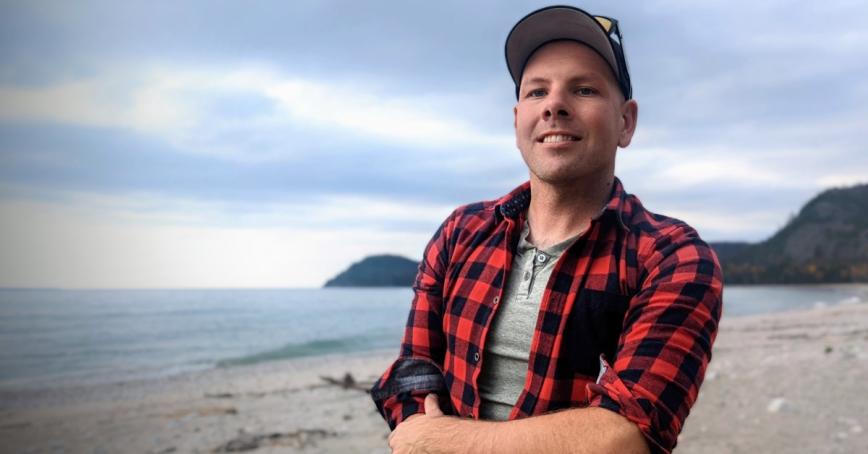RRU students’ doctoral film calls “Action!” on liver wellness conversations
Topics
Featured
Share online

What comes to mind when you hear “dissertation”? Traditionally, it calls to mind weeks spent in the library poring over texts, hours in a science lab or writing hundreds of pages to complete a thesis.
But Gary Hayes and Kate Dunn are taking a different route to complete their PhD — their years of research culminated in a film.
And it’s the how of their film that is the core of Hayes’ Doctor of Social Sciences dissertation, which will examine how leadership, relationship-building, and engagement can lead to the co-creation of a strategic impact campaign to affect social change.
WATCH: Wholistic Conversations on Liver Wellness: An Indigenous Perspective
Wholistic Conversations on Liver Wellness: An Indigenous Perspective is 23 minutes long and started with the work of Hayes’ research partner and fellow DSocSci student Dunn — who shared her personal insights on the project earlier this year. She worked closely with Indigenous Elders and Knowledge Keepers in Treaty 6, 7 and 8 in Alberta to reflectively listen and learn perspectives on liver wellness. The goals of the research were to investigate the impact of culturally relevant healthcare communication and to co-create a DocuStory video intended for screening with Indigenous communities.
Hayes’ role was built on his background in TV production for Discovery Channel Canada, where he worked as a production coordinator, camera assistant and field producer on shows such as Mighty Trains, MegaSpeed, and Mighty Ships.
But the DocuStory was a different type of production, both in its audience and its goals.
“There was a purpose here. There was an end goal of spreading awareness [of hepatitis C] and encouraging people to get tested,” he says.
Indeed, Hayes notes after showing the film, between 50-90% of attendees get tested with dried blood spot screenings. The screenings were gathered by local community members who received training as a part of discussions that emerged when planning their impact strategy.
The results of each film screening feed into his PhD dissertation, which looks at how he and Dunn engaged communities and organizational leadership to prompt action on health issues. In addition to the community screening, they had two important approaches: one was community-focused, and one was within the health system.
At the same time, they were working with a small First Nation interested in increasing Hep C awareness to prepare for its screening, they also premiered the film at a provincial liver conference in Edmonton. As a result of the screening, Indigenous Services Canada sponsored a mailout of 150 USB drives containing the film to Indigenous health units across Alberta. Additionally, several other First Nations organized their own health days to feature the film and offer screenings. Through further conversations and engagement, the film is now a resource available to all on three Canadian health websites ECHO Alberta, CATIE and the Canadian Liver Foundation.
“Embedding yourself in a world you don’t know, but through a trusting relationship, it allows for more creativity to flow. And that’s where those ideas and those networks and those connections come together for a project like this to reach the people who it needs to reach.”
Gary Hayes, DSocSci student
Hayes explains he learned from Dunn, that liver disease and hepatitis C rates are rising, and culturally relevant resources are integral to addressing disparities in health messaging.
“Developing projects with meaning is important to me, this one shows how much further you can take things through collaboration and designing strategies to co-create impact,” he says.
Not only has the film made a difference in the communities where it has been screened, Hayes says working on it changed him.
“Embedding yourself in a world you don’t know, but through a trusting relationship, it allows for more creativity to flow. And that’s where those ideas and those networks and those connections come together for a project like this to reach the people who it needs to reach.” Hayes is fascinated by how filmmakers, social change advocates, and audiences can enhance their relationship to provide pathways of action to affect change.
In addition to working on his DSocSci, Hayes says he would like to find other film projects that can illuminate and create lasting impact, and for that, he credits Royal Roads, where he previously earned a Master of Arts in Global Leadership.
“My fear was going to school to create a report that nobody sees. I’m not even finished [this project] and I already know that what we’ve done is special and it’s reaching the people it’s designed for.
“It’s looking at how you can co-create programs or tools to help others while pushing yourself to learn more along the way,” Hayes says. “That’s the purpose of school for me.”
Wholistic Conversations on Liver Wellness: An Indigenous Perspective has begun its festival run and, so far, has won Best Short at the Fort Langley Film Festival and received an honorable mention at Virginia Dares Cinematic Arts Awards for Decolonizing / Re-Indigenizing Media and the Film Only Film festival. It’s also being screened at upcoming film festivals including the Three Fires International Film Festival, Regina International Film Festival, the Vox Popular Media Arts Festival, and the International Multicultural Film Festival in Australia.
Interested in learning more about our Doctor of Social Sciences program? Visit the program page or request more information.